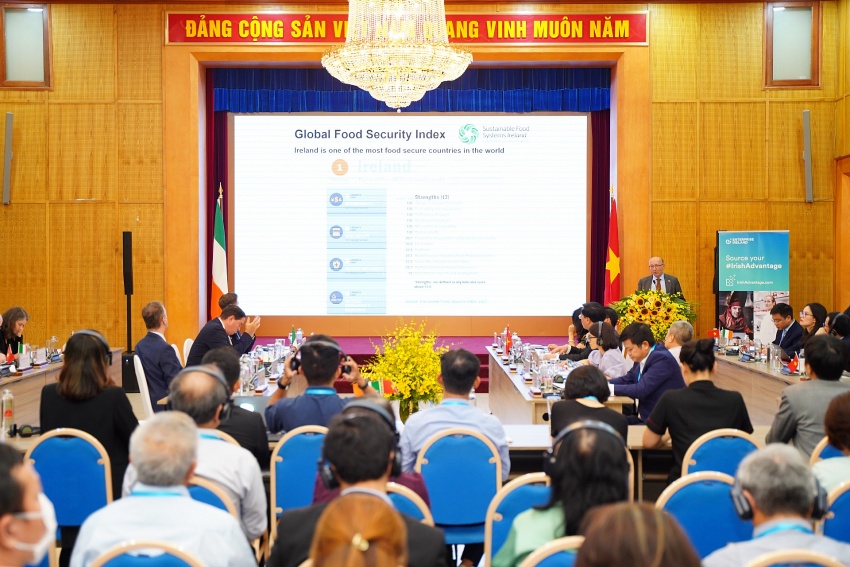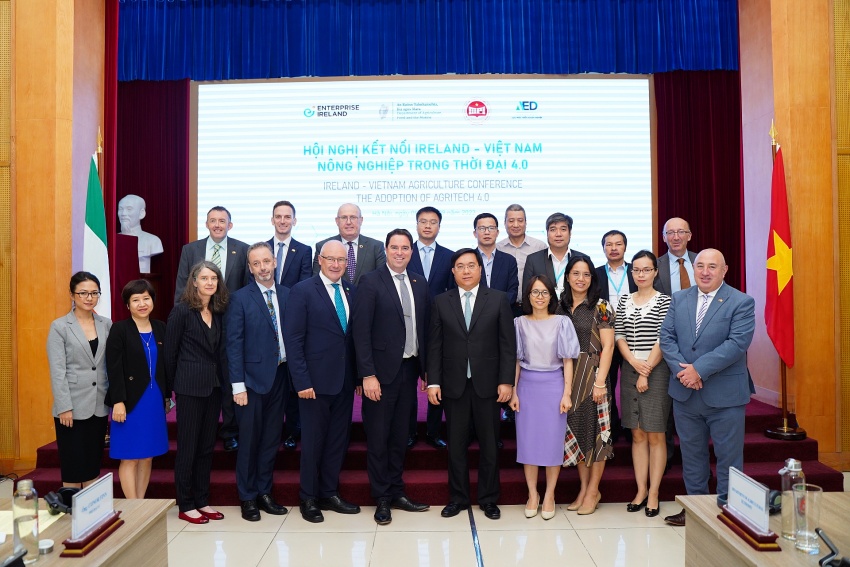Strengthening Vietnam-Ireland cooperation in agritech
 |
| The conference took place at the headquarters of the MPI on September 8 |
The conference was an opportunity for the two sides to share experiences and promote agricultural cooperation, focusing on the application of technology with the goal of building a modern, high-quality, productive agriculture with sustainability and good competitiveness.
At the conference, Deputy Minister of Planning and Investment Tran Duy Dong said that Vietnam and Ireland have a long and sustainable cooperation history. Agriculture and food processing are areas within the framework of cooperation under the Irish Development Experience Sharing Program for the period 2017-2020 between Vietnamese agencies and their Irish partners.
“Promoting further cooperation relations to develop the agricultural industry as well as promoting business links between the two countries is necessary, especially as each country considers development in association with high technologies and sustainability a top priority," said Dong.
Despite many important achievements, Vietnam's agricultural sector still faces many challenges such as limitations on mechanisation, lack of breeds and livestock, an unsustainable consumption market, and poorly skilled human resources.
Meanwhile, the Irish food and agricultural sector is nearly leading over the world. Therefore, the MPI wants Ireland to share information on agricultural development, especially in livestock, as well as enable Vietnamese agricultural enterprises to access modern Irish technologies and research, contributing to boosting the export of Vietnam’s agricultural products to regional and global markets.
Martin Heydon, Irish Minister of State at the Department of Agriculture, Food, and the Marine said that the two countries should explore the potential for cooperation and development in agriculture, food, and ready-made goods, especially since the EU-Vietnam Free Trade Agreement came into effect.
In the 10-year strategy to develop the agriculture and food industry, Ireland targets to become the leading food supplier in the world with top-quality products, ensuring the production process based on the value of food, health, nutrition, and the environment.
“To do this, research and innovation is a major key, playing an important role in solving challenges and unlocking new chances. This is also Ireland's top priority towards the sustainable development of the agricultural sector,” said Heydon.
He also reaffirmed that the Irish government and businesses are willing to promote investment and cooperate with Vietnam in the application of advanced technologies to build an agriculture that can adapt to climate change and reduce greenhouse gas emissions.
 |
| The Irish government and businesses are willing to promote investment and cooperate with Vietnam in the application of advanced technologies to build an agriculture that can adapt to climate change and reduce greenhouse gas emissions. |
Vietnam's livestock industry is very diverse in livestock species with a high scale and density of herds such as around 24 million pigs, 525,000 kinds of poultry, and nearly 6 million cows. In the livestock development strategy to 2030, the livestock industry aims to grow in both output and herd size.
However, according to Nguyen Xuan Duong, standing vice chairman of the Vietnam Livestock Association, the livestock industry still faces many difficulties and challenges, such as that technology in the agriculture sector remains uneven and unsynchronised. Cattle production and milk processing have the most modern technology, which is the most advanced in Asia and derived largely from Europe and the US.
Industrial pig and chicken farming of large enterprises and farms (accounting for about 30 per cent of the total) has modern automated technology from the EU, US, and Taiwan.
“However, slaughtering and processing technologies of livestock products are still limited. Currently, about 20 per cent of the market share is modern,” emphasised Duong.
To overcome shortcomings, Duong proposed to quickly restructure the organisation of livestock production according to value chains, bringing into full play the role of enterprises, associations, and cooperatives to encourage farmers to join the chains, as well as adjust the planning, reduce the scale of high-grain livestock, and develop intensive farming of feed crops.
“It is necessary to apply automatic and biotechnological technologies in animal husbandry following standards on biosafety, recirculation, and environmentally-friendly husbandry,” added Duong.
In the field of cow husbandry, Pham Van Gioi from the Institute of Livestock Production under the Ministry of Agriculture and Rural Development proposed that the livestock industry should strengthen the supervision of livestock law enforcement, support the shift of small-scale livestock production to a centralised form, and improve the cow husbandry management system towards organic and biosecurity, among others.
At the conference, the state management agencies, experts, and businesses of the two countries discussed, shared experiences, and proposed cooperation for the development of the two countries' agriculture sectors in the future.
What the stars mean:
★ Poor ★ ★ Promising ★★★ Good ★★★★ Very good ★★★★★ Exceptional
Related Contents
Latest News
More News
- SK Innovation-led consortium wins $2.3 billion LNG project in Nghe An (February 25, 2026 | 07:56)
- THACO opens $70 million manufacturing complex in Danang (February 25, 2026 | 07:54)
- Phu Quoc International Airport expansion approved to meet rising demand (February 24, 2026 | 10:00)
- Bac Giang International Logistics Centre faces land clearance barrier (February 24, 2026 | 08:00)
- Bright prospects abound in European investment (February 19, 2026 | 20:27)
- Internal strengths attest to commitment to progress (February 19, 2026 | 20:13)
- Vietnam, New Zealand seek level-up in ties (February 19, 2026 | 18:06)
- Untapped potential in relations with Indonesia (February 19, 2026 | 17:56)
- German strengths match Vietnamese aspirations (February 19, 2026 | 17:40)
- Kim Long Motor and AOJ Suzhou enter strategic partnership (February 16, 2026 | 13:27)

 Tag:
Tag:


























 Mobile Version
Mobile Version